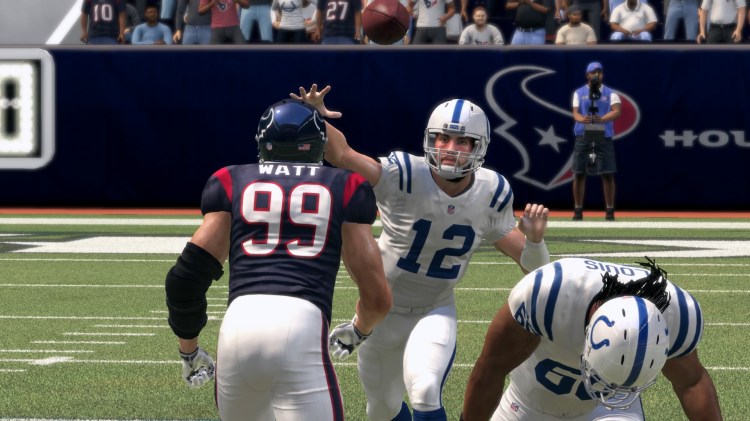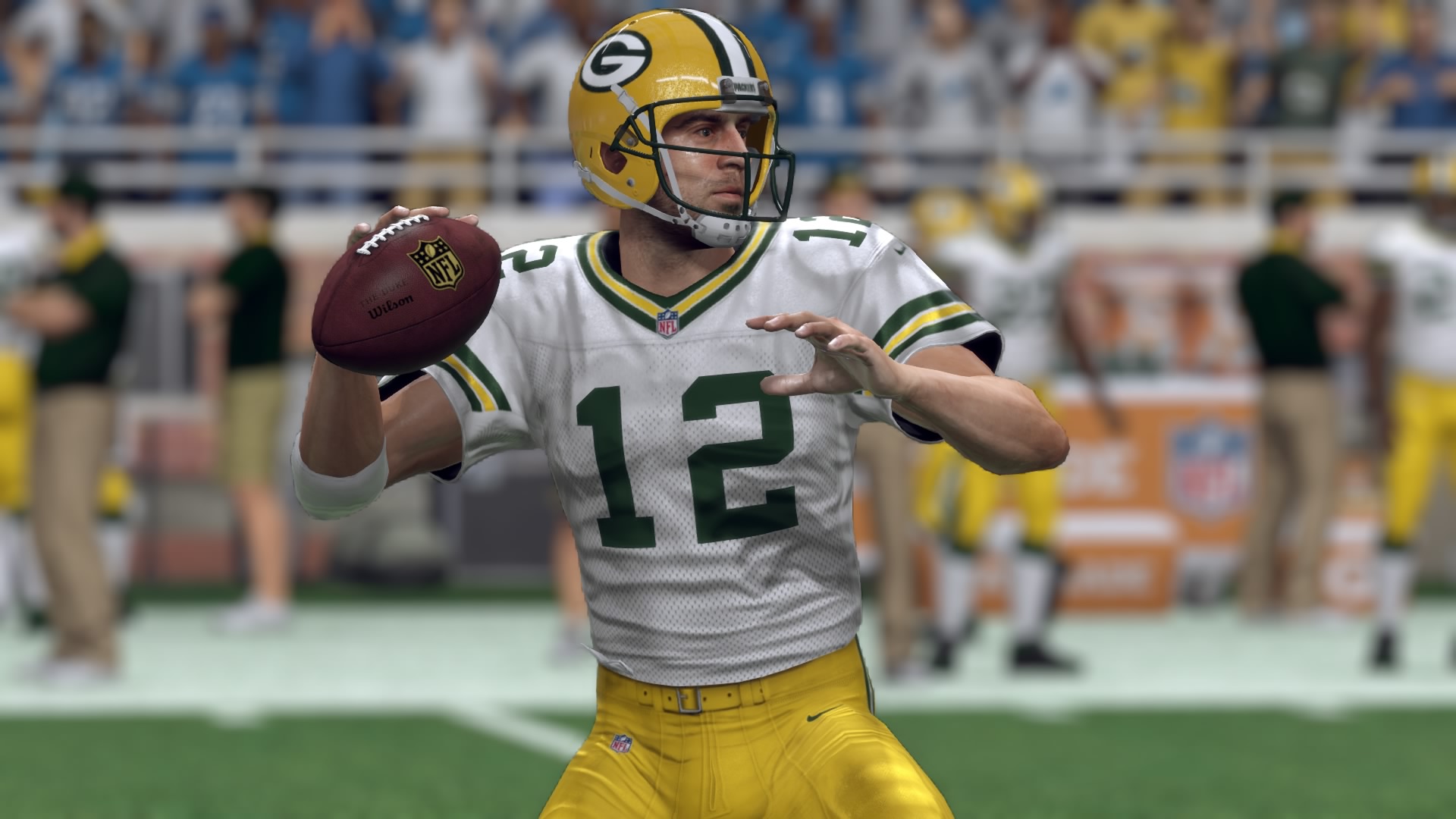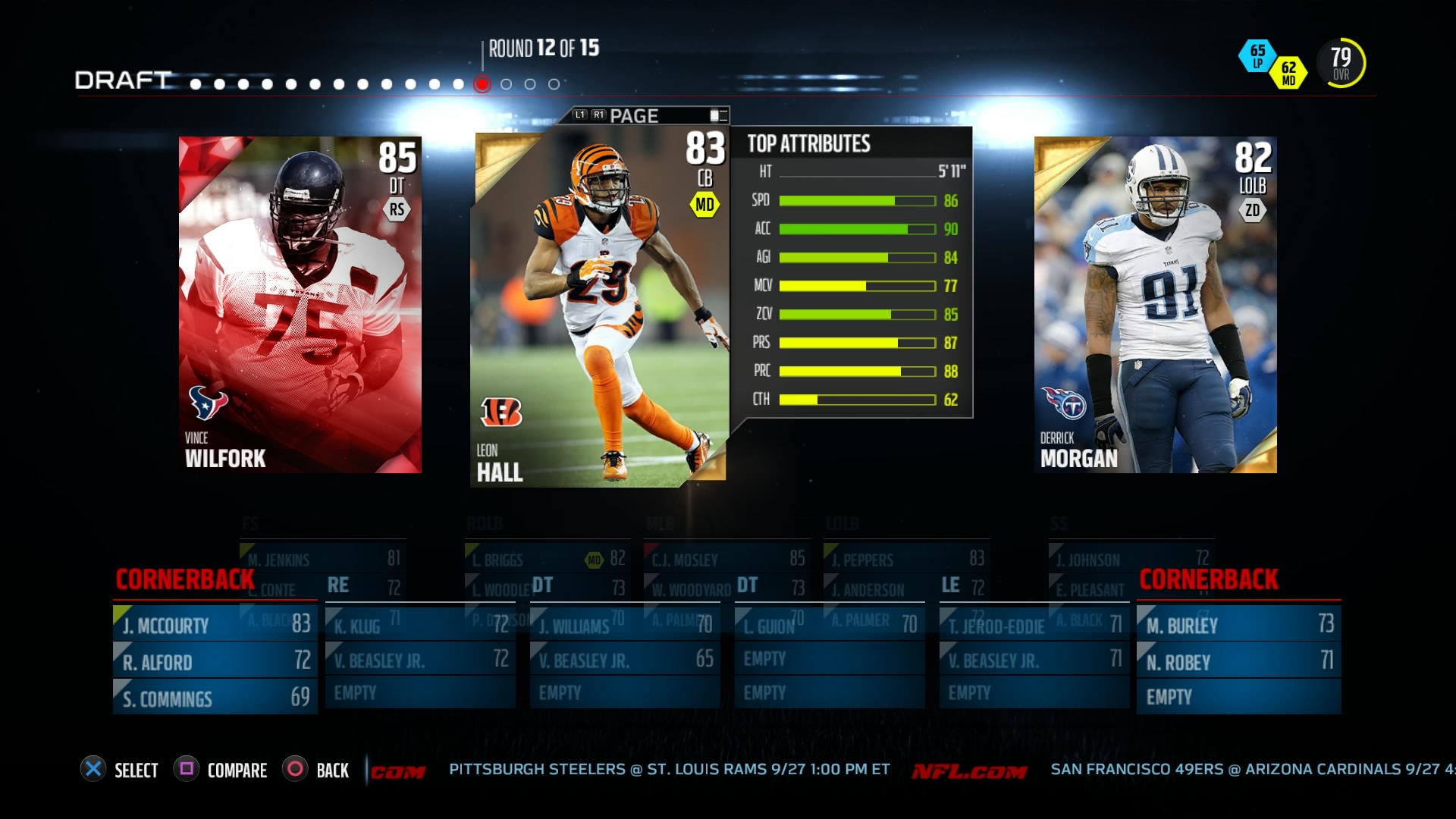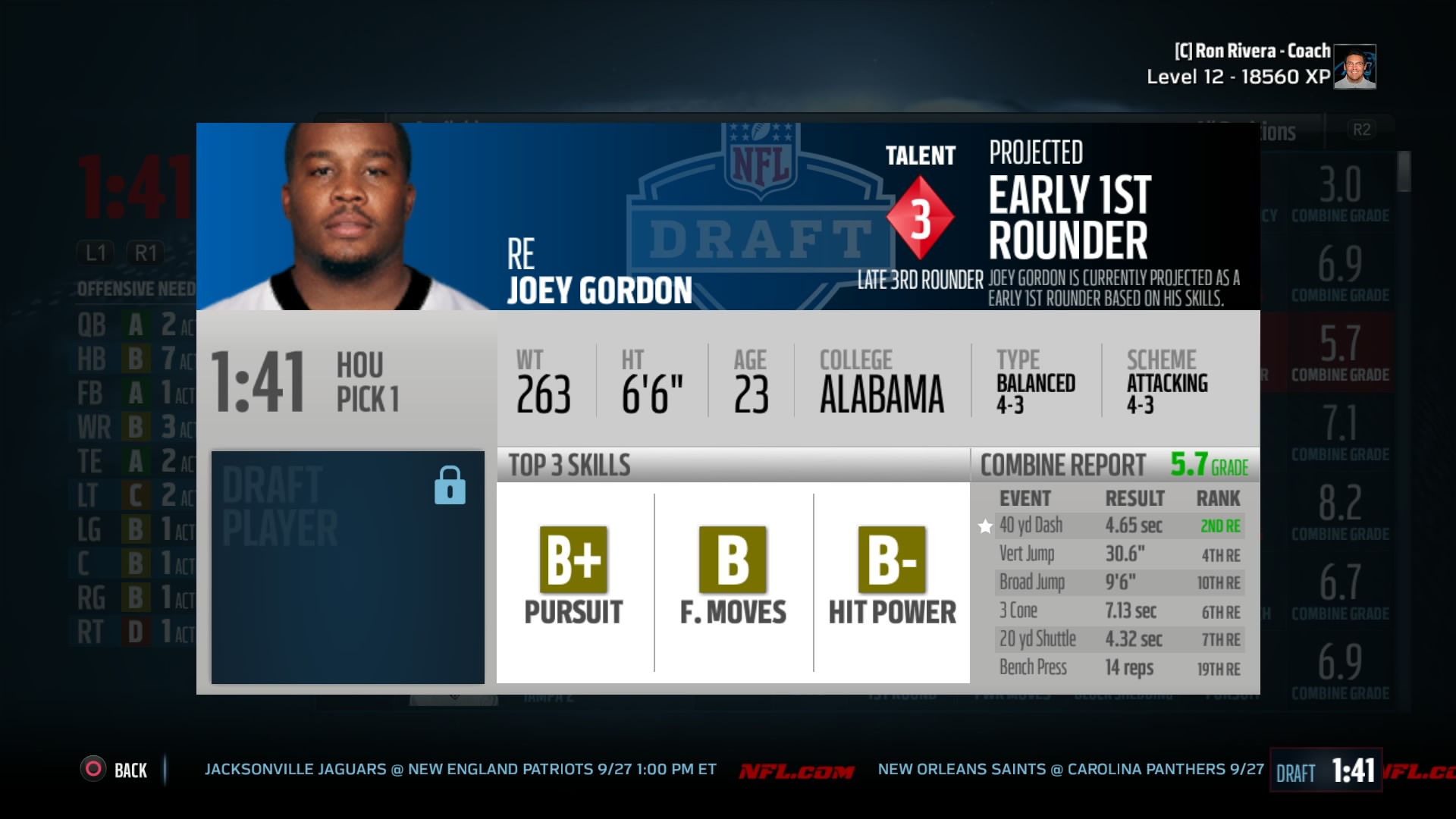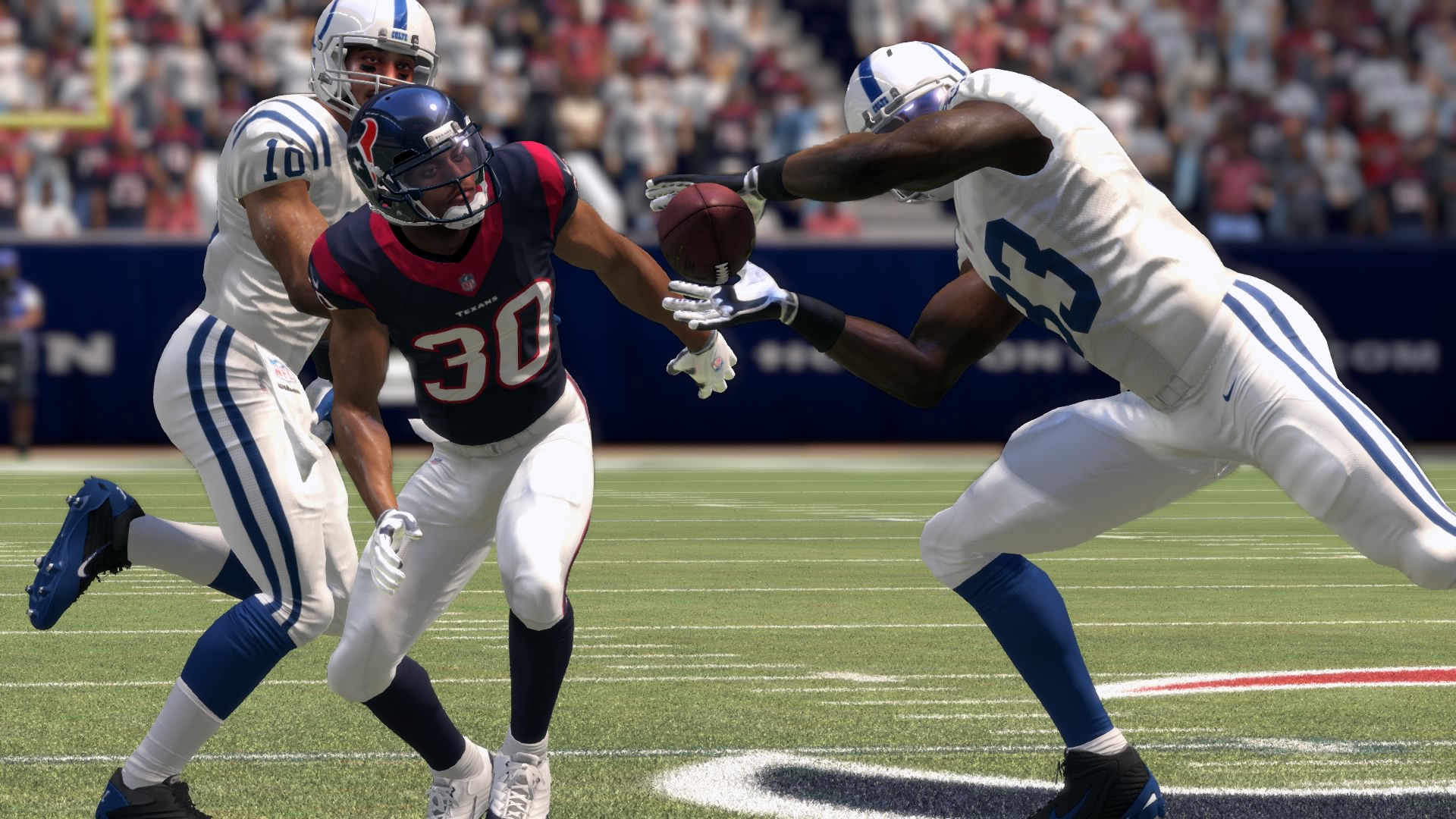Madden NFL 15 was a wakeup call for EA Sports.
While the publisher largely appears hell-bent on turning its pro football video game series into a near-realistic simulation of the sport, last year’s entry juked players’ expectations by loosening its interpretation of the term “authentic.” It gifted defensive players more agency and control at the risk of busting the allure of broadcast-style football with additional meters, gauges, and visual indicators only found in video games. Madden 15 traded in pieces of its “like watching football on Sundays” appeal to make the game actually play better.
Check out our Reviews Vault for past game reviews.
Compared to players’ expectations in the hi-res gaming era, it was a gamble that paid off. EA Sports is now going all-in — and ultimately breaking even — with Madden 16 (I review both the PlayStation 4 and Xbox One versions), a game overflowing with big moments and equally large issues.
What You’ll Like
Presentation gets a bigger boost
Visually, Madden continues to veer into uncanny territory. Following its post-launch likeness patch, even more athletes received the HD face scan treatment, lending more pockmarks to your favorite players. Madden 16 is gorgeous, bolstered by onfield 3D structures and popups feeding players game stats during key moments of the broadcast, such as the introduction of each starting quarterback.
EA hasn’t lost its touch in delivering a quality broadcast-style package, blending on-field, after-the-whistle activity with film-quality camera angles to up the ante on the viewing experience. EA Trax returned to Madden this year, bringing an excellent soundtrack to your menu screens that nearly rivals tune selection found only in the FIFA series. The lone downside to Madden 16’s game presentation is the commentary duo of Jim Nantz and Phil Simms, whose rote lines grow tiresome quickly, but that doesn’t in any way ruin the fun.
Under control
The most glaring shift in Madden’s action is more nuanced passing, defending, and catching controls. Quarterbacks can now put defter touches on their passes, targeting receivers high and low to fit throws into tighter windows. These controls are a little more difficult to pin down compared those for catching the ball, which no longer boils down to mashing a single button. As the ball is in the air, players now press one of three buttons to trigger specific catching styles, each suited for specific circumstances, such as the catch-and-run button to field the ball in space and turn upfield to gain extra yards. When used correctly, these mechanics add a little more interactivity and force players to make smart decisions quickly, further considering their receivers’ surroundings in order to be successful. It helps that the game’s overall speed is down a notch to give players that extra half-second to press the right button at the right time.
Draft Champions is Madden + fantasy football
It’s always noteworthy when an annual sports series introduces an entirely new mode, and Madden 16’s big addition is Draft Champions, the franchise’s beacon for fantasy football players. In it, players receive mediocre team with the chance to upgrade it through 15 quick rounds of drafting, picking between three athletes in each round. Do you pluck Jimmy Graham to load up at tight end early even though his playstyle doesn’t fit your team’s scheme as dictated by your head coach? Or do you jump at a strong defensive tackle in Terrance Knighton to stuff your opponent’s rushing attack? After putting your team together, you must win three games in a row in solo offline play or four games against online human opponents, each victory making the reward, a Madden Ultimate Team card pack, all the sweeter.
Streamlined scouting in Franchise mode gets you back in the action
Aside from the new controls and accompanying visual indicators, EA Tiburon might have spent the most time with Franchise this year, Madden’s multipurpose career mode. Yes, you can still guide single athletes, coaches, and owners on paths to greatness, but a few of the crucial pieces to franchise have changed this year. For starters, EA went back to the well to revise its scouting process yet again (making for, essentially, the fourth type of scouting system or layout change in five years for the series’ career mode).
Madden 16 saw a much more dramatic shift in how fictitious rookies in the game are scouted, however, as players no longer use scouting points to unlock individual skill ratings for prospects, but are instead granted a look at an athlete’s three best traits in letter grade form. Additionally, incoming rookies are assigned a projected draft round as well as a grade on what draft round their talent and skillset fits into, only accessible if players dole out the full amount of skill points needed to obtain that information.
While I didn’t have a problem with the previous scouting system, the condensed version is fantastic in how it better represents the real-life flaws of football scouting departments. Once you take the plunge and draft the player, you’ll then learn what their flaws are, even if some were hinted at based on combine numbers. In one case, I was fairly certain a B+ man coverage grade would pan out well for the cornerback I was targeting, only to discover his slow speed after he joined the team. The system is an excellent way of streamlining one of the more plodding, menu-heavy processes in the career mode while giving the management-focused players enough satisfaction when they find diamonds in the rough (such as the 6-foot-6 tight end I snagged in the fourth round thanks to his 4th-best 40-yard dash time at the scouting combine; he ended up being the best player I got in the draft).
What You Won’t Like
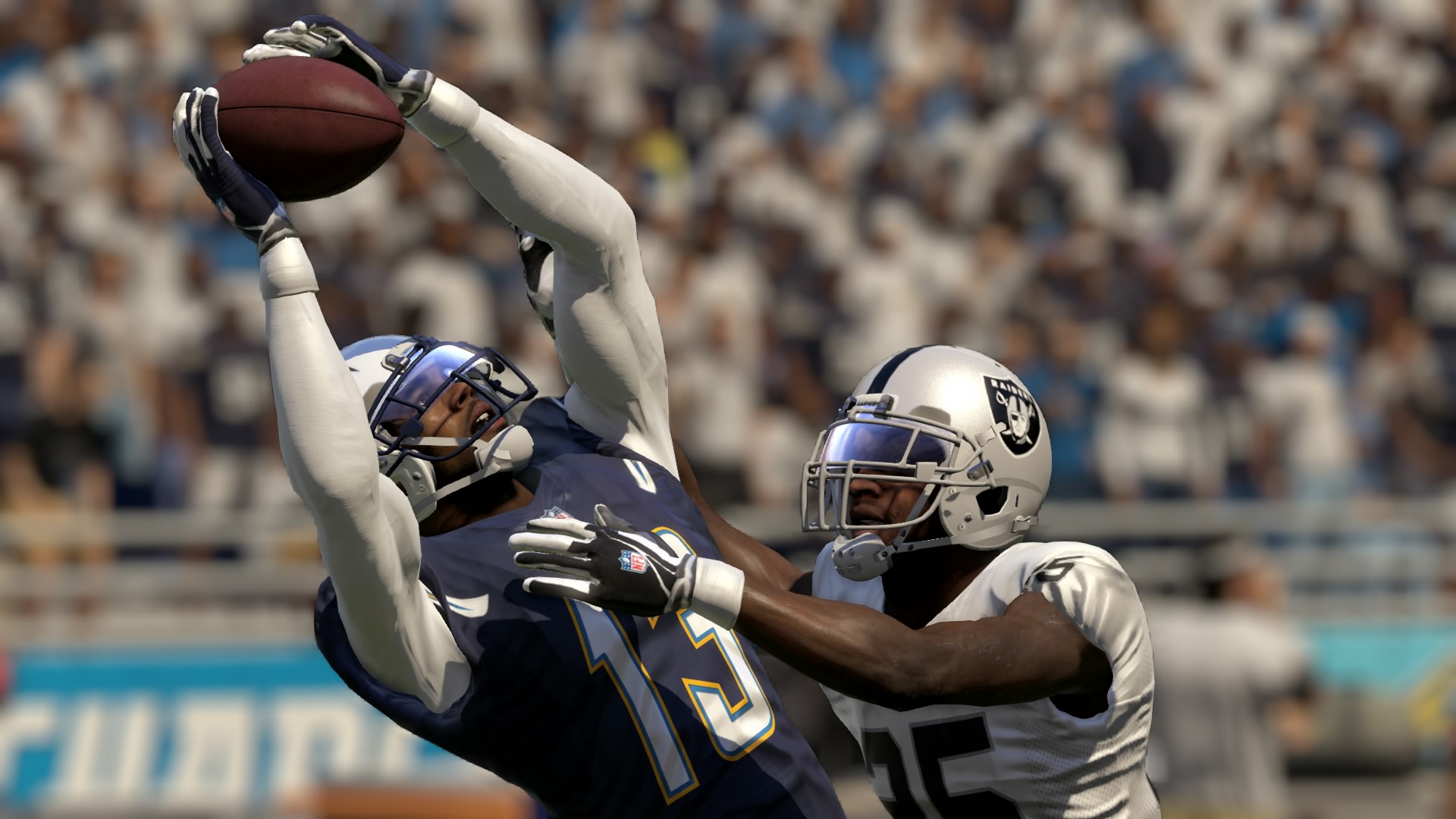
Above: Epic catches like this are easier to make in Madden this year (even if you’re not playing the Oakland Raiders).
Aggressive catches are out of control
As much as the new controls deepen the experience of moment-to-moment football, they occasionally come off as frustrating and borderline exploitable. Take the new aggressive catch button. By now, if you’re even remotely familiar with pro football, you know about New York Giants wide receiver Odell Beckham, Jr.’s, one-handed catch last season. EA Sports has done everything in its power to make sure you don’t forget it, from plastering images of OBJ making a single-handed grab on the game’s cover and title screen to giving every damn receiver in the game the ability to make the same catch.
Sure, pro football players should be able to make one-handed grabs in addition to a number of other leaping catch animations that pop up with the new catching controls, but the frequency at which the receiver wins the battle for the ball in the air against a defensive back in Madden 16 is lopsided. The formula for this year’s successful deep passing game is fairly easy to master: Lob the ball to a tall wide receiver and smash the aggressive catch button.
It helps that defenders also can make decisions on whether to play the ball in the air or the player, attempting to intercept and swat passes or tackle receivers as they make the catch. Still, you’ll witness an OBJ-like grab from receivers of all sizes and skill levels. I can speak to its consistent success with players such as Rod Streater, John Brown, Dorial Green-Beckham, and Davante Adams, some of them being much more believably adept at leaping catches than others. Were it not for the constant absurdities, the new catching and defending controls would be an overwhelming improvement on the previous Madden formula.
Draft Champions is not enough
Draft Champions is a brilliant twist on the traditional game of Madden, but its appeal diminished after a few playthroughs. The developer deserves a ton of credit for devising Draft Champions, but more can be done with it yet, and any number of changes feel sorely needed after a few rounds in the mode. It would be wonderful to turn my Draft Champions team into a long-term franchise, or use it tackle situational challenges. Even tweaking it to add some of the zany features of the gauntlet challenge from the game’s Skills Trainer mode and implementing some kind of tournament system could take Draft Champions to the next level. The mode has the potential to turn into a staple for the series, if not all of EA Sports’ major properties, but it’s just too light to carry the game in its current state.
Disenfranchised
EA Sports deserves credit for aggressively attacking Franchise this year, as evidenced in dynamic player goals. Those aforementioned stat pop-ups are a heavy part of the game’s career mode, now displaying ever-changing in-game goals for your team between plays. For example, the game may offer bonus experience points and a confidence boost to your players for getting two first downs in one drive early in the game, or will challenge you to hold onto the ball for two minutes to wear the opposing defense out. Generally speaking, it’s a good way of pacing your career and keeping the mode moving forward on a play-by-play basis.
Still, Franchise mode’s progression system has some fundamental issues. First off, the goals often feel arbitrary and clash with any kind of scheme and play style you may try to implement in a given drive. Late in one game with my star running back, I aimed to close the game out with a few first downs, as our team was ahead by two scores. Franchise mode had a different idea, as it challenged me to get two receptions, something most conservative offenses don’t have much interest in at that stage in a game. I even witnessed my offensive players getting a confidence boost for not allowing the quarterback to be sacked, even though it stalled out and was forced to punt.
As for the other core issue: Player progression in this mode is heavily reliant on meeting weekly and milestone goals. Your player won’t advance too far in his career without getting big chunks of experience points, much of it coming from these in-game dynamic goals as opposed to the weekly “game prep” mini-games. There isn’t enough wiggle room in the mode to reward players for developing their own scheme to exploit a weakness in their opponent and succeed, making the mid-game goals feel entirely arbitrary.
Conclusion
The issues with Franchise mode are a common problem I have with EA Sports’ flagship series: Its focus has increasingly narrowed in how players are expected to enjoy their favorite sport (nevermind the fact that it’s the only real NFL football series fans can turn to these days). Want to mess around in Franchise and guide a strong-legged kicker through his career as a clutch special teams player that makes 50-plus-yard field goals at the most important times? Sorry, you’re limited to a handful of positions in Franchise mode, and kicker isn’t one of them. How about enjoying an alternate universe where the NFL features only 24 teams split into four divisions? No, it doesn’t offer those sort of tweaks to the league structure.
One of the things standing in EA’s way here is its penchant for introducing a game riddled with bugs and balance issues that need correcting in further updates. I would be remiss if I didn’t at least encourage prospective buyers to do a Twitter search here or there; they would encounter dozens of videos and screenshots of invisible cornerbacks intercepting passess as well as left tackles that gave up a record-breaking number of sacks in a season, plummeting their pass blocking ratings. The publisher already seemingly squashed some of these issues in a post-launch title update. I haven’t seen the aforementioned left tackle issue since, yet Franchise mode in particular is a work-in-progress. I can’t say I’ve seen every bug being reported, but the career mode has locked up on me in the mid-game pause menus and has also failed to display stats for some athletes in the league.
Based on the publisher’s history, there’s no saying Franchise mode’s dynamic goals or the multiple passing, catching and defending controls will return in future versions of the game. Even so, EA Sports will need to go back to the drawing board to fine-tune these additions to turn them into the game-changers they truly can be. The developer’s decision to gift players more receiving controls was met with issues in how those new mechanics played out, and the benefits of those fresh aspects of the on-field play don’t balance out the woes of Franchise mode’s shortcomings in its progression system. Even enjoyment from the best part of Madden 16 in Draft Champions dries up after a few trips through the mode. Madden NFL 16 is a good transitional entry in the series, introducing promising features that are either incomplete or weighed down by bugs.
Score: 78/100
Madden NFL 16 is out now for PlayStation 4, Xbox One, PlayStation 3, and Xbox 360. The publisher provided GamesBeat with both PS4 and Xbox One copies for the purposes of this review.
VentureBeat's mission is to be a digital town square for technical decision-makers to gain knowledge about transformative enterprise technology and transact. Learn More
